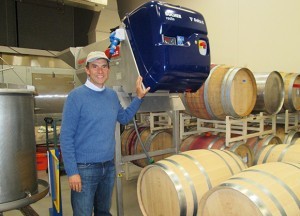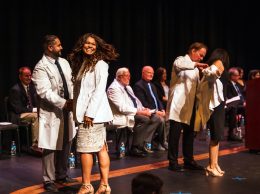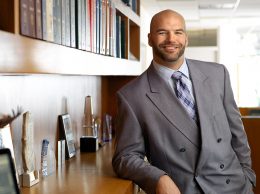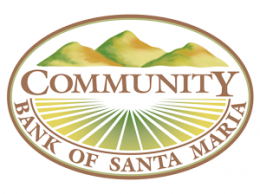Allan Hancock College rolls out a new winery on campus
IN THIS ARTICLE
- Central Coast Topic
- Tom Bronzini Author
By Tom Bronzini Friday, November 21st, 2014

Alfredo Koch, of Allan Hanckock College’s viticulture and enology program. (Courtesy image)
When Alfredo Koch assumed leadership of Allan Hancock College’s viticulture and enology program eight years ago, students were using a small, hand-operated basket press to crush grapes in part of an old campus building with about 600 square feet available for winemaking.
This fall, students at the community college in Santa Maria moved to a new campus winery that has the look and scale of a commercial operation.
Michael Larner, who teaches classes at the college and is winemaker and owner of Larner Vineyard & Winery in Ballard Canyon, said the facility completes the educational package by offering an environment a lot more like the real world of winemaking.
“We can do micro fermentations and now we can do larger scale fermentations so we can see both sides of the spectrum, which is always something you need to do in the industry, is compare how small stuff works to big stuff,” Larner said.
Koch, coordinator and instructor for Agribusiness, Viticulture and Enology at the college, showed me the 1,800-square-foot winery that is part of a new, $17.6 million Industrial Arts Complex on campus. He pointed to some old grape presses and destemmers on a paved area outside the winery and then led the way inside, where the gleaming new equipment looked to be five or six times the size.
A membrane press can process 800 liters of grapes in one batch and can be programmed to render a softer or stronger crush. A new destemmer can handle a ton of grapes per hour. Eight steel-jacketed tanks hold wine at precisely controlled temperatures, and the winery has a bottling machine and a vacuum corker, among other equipment.
Koch, who holds a Ph.D. in viticulture from UC Davis, said he expects the new winery to be bonded soon so student-made wine can be sold. He wants students to have the mindset that they are making commercial wines. “It has to be really good, to the best standards,” he said. “Once we are bonded, they will realize more of that, so their attitude is to have a wine that will be on the market.”
Students grow many varieties of wine grapes on a four-acre campus vineyard near the new facility. They include syrah, chardonnay, cabernet sauvignon, albarino, torrontes, and four clones of pinot noir. Students in a viticulture practices class also get hands-on training at a Kendall Jackson vineyard in Los Alamos under supervision of the vineyard manager.
Koch said the new Hancock facility has allowed the school’s agribusiness, enology and winemaking program to grow, with twice as many students and twice as many courses as it had before. Enrollment is at 260, and Koch was eager to spread the word about the rollout of 10 new basic agriculture courses in areas such as soils, irrigation, horticulture and agribusiness.
Many of the viticulture and wine classes are taught by professionals from the industry. Among them are Wes Hagen of Clos Pepe Vineyard, Chris Brown of Central Coast Wine Services, Doug Braun of Presidio Winery, and Larner.
Koch said a new state law taking effect in January will be of great benefit to student winemakers, allowing them to taste the wines they are making, as long as they don’t swallow. “I think it’s a big advantage because it’s very difficult to realize how the wine is going to be and what are the outcomes of different protocols and treatments without tasting it,” he said.
Students in the program can earn an associate in arts or associate in science degree for transfer to a four-year college. Koch said many Hancock students go on to Cal Poly San Luis Obispo, Fresno State or UC Davis, and many others find positions directly in the industry. Plus, some workers from the industry enroll in classes to pursue a specific skill.
Marianne McGarry Wolf, interim head of Cal Poly SLO’s Wine and Viticulture Department, said Hancock students can transfer their lower division course credits. She said Cal Poly is refining plans and raising funds for a $10 million wine and viticulture center to replace its 800-square-foot pilot winery on campus.
Larner said having a bonded winery on campus will be huge, teaching students not only how to grow grapes and make wine, but also how to market a product.
Koch was first exposed to viticulture and winemaking while growing up in the Mendoza region of Argentina, where he spent a lot of time working at his grandfather’s vineyard and winery. He studied finance and accounting at the University of Pittsburgh, sustainable agriculture at Cal Poly San Luis Obispo and viticulture at UC Davis. He has a vineyard in his native country but rarely goes there, he said, because he is devoting his energies to the Hancock program.
Koch said that once the campus winery is bonded, he expects it to produce 500 cases of wine a year, expanding to 1,000 cases eventually.
Koch and Larner said there is no other community college in the Tri-Counties that offers a viticulture and winemaking program. “It’s certainly a leg up for Allan Hancock, but also for the Central Coast,” Larner said. “Santa Barbara County is a strong grape-growing region, and this is going to be just another feather in its cap.”
• Contact Tom Bronzini at [email protected].
Related Articles
 Friday, September 16th, 2022
Friday, September 16th, 2022










